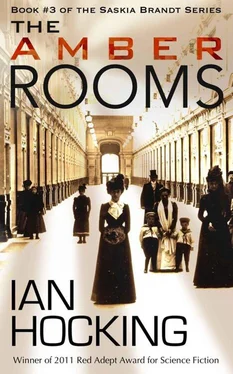The Countess was no older than thirty-five. She wore a décolleté gown of cyan velvet. Her eyebrows were plucked to hawkish lines. Her smile, however, was warm enough, and she held Saskia’s hand a breath longer than etiquette required following their brief meeting of cheeks. The Countess did not appear to notice that Saskia kept her left hand in the warmer.
‘May I speak French?’ asked the Countess.
‘Of course, Countess.’
‘Please,’ she said, settling on the chair opposite. Her laugh was false but artfully delivered. ‘You must call me Charlotte.’
Saskia sat on the edge of a cushioned sofa. Her back was quite straight. ‘And you must call me Mirra.’
The two women sat without speaking for a moment. Charlotte did not move her eyes from Saskia, who felt that—to use the phrase of a Georgian bandit of her acquaintance—there was enough ambiguity to be unambiguous. Saskia tipped her head a fraction. The gesture invited the Countess to speak with candour.
‘The truth is,’ she said, turning to the sunlit windows, ‘you are rather more beautiful than I had wished.’
Saskia felt relieved. The introduction of another woman into the family unit would explain the Countess’s unease. Saskia had been worried that the Countess suspected her for a revolutionary. She leaned across the table and took her hand.
‘Let me be indelicate,’ she said. ‘I’m used to it.’ She weighed the Countess’s expression. ‘My love and I are separated by an ocean greater than all the Russias. “Never to let this lose me grace / But rather bring you back to me—”’
‘“Amongst all mortal women the one / I most wish to see,”’ Charlotte said. Her eyes had reddened with tears.
A look passed between the women. It was understanding, or its approximation. Saskia felt the ghost hand of her former mentor on her shoulder, and could imagine the Caucasian congratulating her on this flourish.
‘You are the perfect guest,’ Charlotte replied. ‘And I am failing as a hostess. Would you like tea?’
Saskia’s reply was interrupted by the appearance of no fewer than three manservants. These were costumed in an English Georgian style. Saskia watched them approach along the central carpet. They wore slippers and walked in step. The tea they presented was English in style: ornate tea pots, a selection of scones, jams, fruitcake, and iced buns. They assembled this into an ornate mountain and departed the room as one.
‘I apologise for their clumsiness,’ said Charlotte. ‘We’re holding a ball tonight. My best people are scattered about the city.’
‘Not at all.’
The Countess poured Saskia’s tea. ‘The Count will have told you that Pavel Eduardovitch has troubled several of his previous tutors. He has troubled them to the extent that they have left our service.’
‘I see.’
‘He does, however, have an interest in mathematics and wishes to enter the Imperial University. He is a special case and must pass an interview in three days’ time.’
Saskia sipped her tea. Despite her preoccupations, Pavel Eduardovitch was beginning to interest her.
‘I admire the piano. Does your son play?’
‘It was a gift from my father to my daughter, Ludmilla. She died before it was delivered. It is never played.’ The Countess turned. ‘Here is my son.’
Pavel Eduardovitch opened the door himself. He wore a grey frock coat with embroidered lapels, and white broadcloth trousers. His collar-length hair was swept back. He approached the two ladies but did not sit down. Neither did he look at Saskia or his mother. His eyes were drawn to the windows. Saskia did not judge his indifference to be affected. She knew him to be seventeen years old, but he might have passed for fifteen.
Charlotte looked at her son.
In soft English, she said, ‘Introduce yourself, Pasha.’
‘I am Pavel Eduardovitch,’ he replied. His English made him sound like a ventriloquist’s dummy. ‘I am plissed to make your acquaintance.’
Saskia took his hand. He did not look at her. ‘Look at me.’
He did. His eyes were restless.
‘Once more,’ Saskia said. ‘Pleased.’
‘Plissed.’
‘Again. Spread your lips more and keep your tongue high.’
He tried not to smile. ‘Pleased. I am pleased.’
‘I am Mirra Tucholsky. I am also pleased.’
‘Will you teach me English, Madam?’
Saskia said nothing. She looked Charlotte, who seemed amused by the exchange.
‘Darling,’ Charlotte said, returning to French, ‘it is time for your walk now. Three times around the garden. I will have Ivan watch you.’
Many hours passed before Saskia could meet Count Nakhimov. The hundred guests arrived at nine o’clock, precisely at sunset, and remained until four, when the sun returned. Not yet the White Nights; they were a month away. As though the dawn had fairytale significance, the gloved hands of the nobility parted and slipped into the day, their carriages ringing with conversation. Only then did Count Nakhimov appear. Saskia was left with memories of black, polished boots and epaulettes and earnest young men who wished to dance with her. But she never danced. She was content to let the evening progress before her: on a dance floor as large, it seemed, as the concourse of Moscow Station, sided with mirrors that projected the scene endlessly, repeating the themes of gold and ivory. She sat even as the orchestra played one of the Hungarian Dances by Brahms.
There had been, as ever, political discussion among the wallflowers. Saskia was surprised to overhear snide remarks about His Majesty. These guests were permitted by birth to enjoy the gilded life of the Russian aristocracy, and yet they seemed contemptuous of its source. Saskia had once spent two late summer months gathering corn in the Ukraine with anarchist friends. The peasants there had idolised the Tsar. They were happy with the Tsar’s ration; they thought that the Tsar would save them—in every sense. It had underscored Saskia’s belief in the operatic absurdity of Imperial Russia’s prolonged death. Those peasants were content to listen to Saskia and her friend Angela as they read from their copies of The Manifesto of the Communist Party. The peasants listened even as they lay in their lice-infested bunks. But, come morning, they had forgotten the message, and the men in the worker blocks muttered that they would sooner have prostitutes than these pious, polite readers. The peasants had settled on their life’s meaning: an ex-soldier called Nicholas, their Little Father. When Angela called him Nicholas the Last, the peasants rebuked her.
Meanwhile, at the ball, dawn had come. Saskia stood alongside the Countess and thanked the retreating guests. She spent a particular, friendly moment with an ancient Colonel called Yuri who had fought at Sebastopol. She was polite enough to accept a dozen calling cards from suitors. Later, she would drop them into one of the porcelain stoves that perfumed the air.
The Countess had told her about the intricacies of Petersburg social life. Each Grand Ducal court had its clique. The most regarded was that of Grand Duchess Marie, wife of the Grand Duke Vladimir. Saskia watched her as she spoke. Was there irony in her tone? Was she presenting a caricature of her life?
At dawn, the servant passed a note to the Countess, who read it, nodded, and said, ‘Sister, the Count has arrived. You will find him in his office. Follow Fyodor.’
Saskia was led through to the pied-à-terre. Once in the small drawing room, she waited for the servant to withdraw. The Count was standing at the mantelpiece of a hearty fire. He wore a beige, puff-breasted suit. His moustaches were voluminous and his beard short—both a tribute to his Tsar. He covered his baldness with a terrible comb-over that Saskia found at once distracting and charming. As ever, the air was ripe with Mouchoir de Monsieur .
Читать дальше












